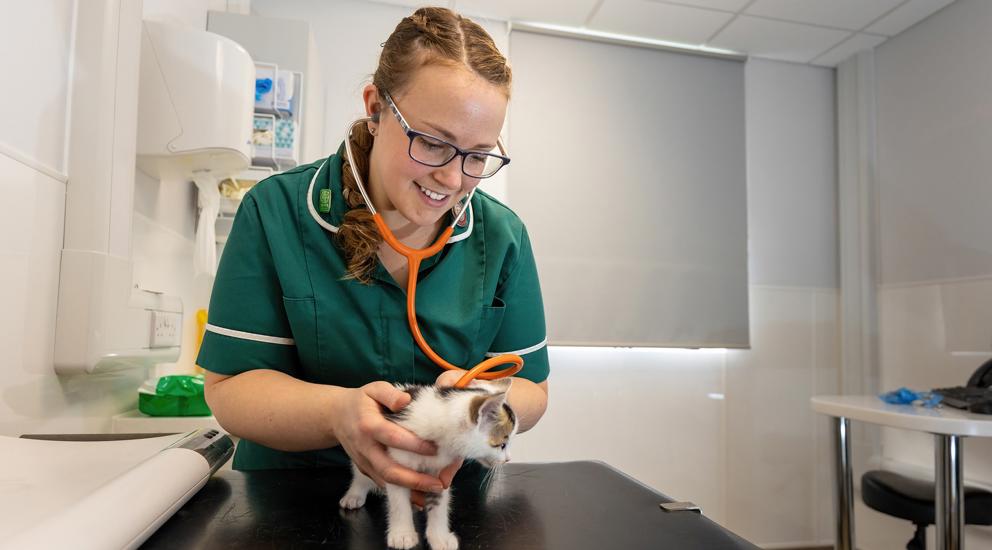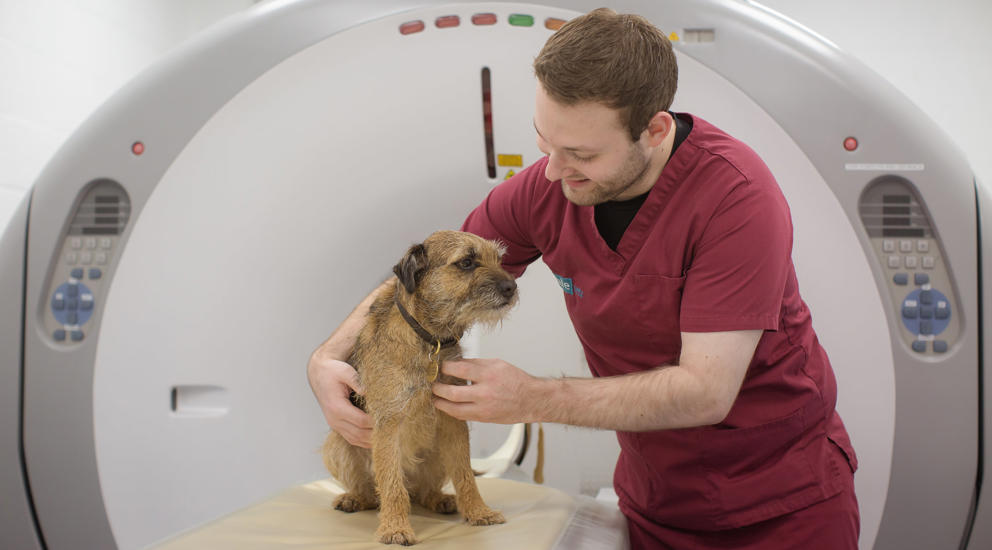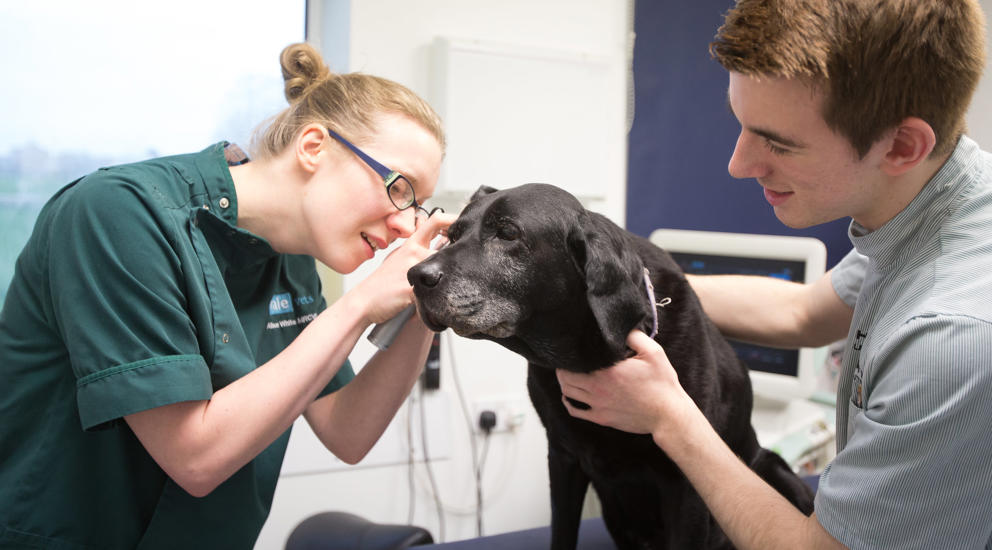Becoming a veterinary nurse requires a diverse set of skills that goes far beyond a passion for animal care. While compassion and empathy for animals are central to the role, a successful veterinary nurse must also be equipped with strong communication, teamwork, and problem-solving abilities, as well as technical expertise in areas such as medical procedures and animal handling.
This self-assessment aims to help you reflect on the range of competencies needed for this profession, from organisational skills and attention to detail to resilience in high-pressure environments. By evaluating your strengths and identifying areas for growth, you can determine if this rewarding, yet demanding career is the right path for you.
Pre-Professional Competencies

As a veterinary nurse it is important for you to be able to talk to clients and make sure they have the information they need to care for their animal.
Ratings - Likert scale
Use the scale to rate your ability to talk to members of the public.
- Very good, good, acceptable, in need of improvement or poor
Reflections
Think about the last time you spoke to a member of the public in a formal setting.
- Write down the thing you did the best in this situation.
- Write down what you could have done to improve this interaction.
The ability to read a person’s body language and respond to them appropriately is an important skill for a veterinary nurse to have. For example, if a veterinary nurse is talking to a client about the medication their animal requires and they pick up from the client’s body language that they don’t seem to understand, the veterinary nurse will need to change the way they deliver the information.
Ratings - Likert scale
Use the scale to rate your ability to interpret body language and adjust your communication accordingly.
- Very good, good, acceptable, in need of improvement or poor
Reflections
Think about the last time you noticed a change in person’s body language when you were talking to them and were required to adjust your communication.
- Write down the thing you did the best in this situation.
- Write down what you could have done to improve this interaction.
Veterinary Nurses work in a team with people carrying out a range of different roles including other veterinary nurses, veterinary surgeons, and receptionists.
To work effectively in a team, veterinary nurses need to support their colleagues, use their initiative, and follow instructions.
Ratings - Likert scale
Use the scale to rate the following:
- Your ability to work effectively in a team
- Your ability to support colleagues
- Your ability to use your initiative
- Your ability to follow instructions
- Your ability to ask for help
Scale:
- Very good, good, acceptable, in need of improvement or poor
Reflections
Think about a time when you have worked as part of a team of people who are undertaking different roles.
- Write down the role you normally take in a team (e.g. leader, implementer, planner):
- Write down how your normal way of team working could be suited to the role of a veterinary nurse.
- Write down the adjustments you would need to make to your normal way of working in a team to suit the role of a veterinary nurse.
When veterinary nurses enter the RCVS register, they take the following declaration:
" I PROMISE AND SOLEMNLY DECLARE that I will pursue the work of my profession with integrity and accept my responsibilities to the public, my clients, the profession and the Royal College of Veterinary Surgeons, and that, ABOVE ALL, my constant endeavour will be to ensure the health and welfare of animals committed to my care."
The RCVS Code of Professional Conduct for Veterinary Nurses sets out the professional responsibilities of veterinary nurses and provides advice on the professional standards.
Ratings - Likert scale
Use the scale to rate your commitment to promote the health and welfare of animals, and to adhere to professional guidelines:
- Very good, good, acceptable, in need of improvement or poor
Reflections
Think about a time when you have made a decision that will influence the welfare of an animal (e.g. finding injured wildlife)
- Write down how the actions that you took promoted the welfare of the animal.
- Write down what you would do differently in a similar situation in the future.
Veterinary nurses need to be dependable and often work long and unsociable hours.
Ratings - Likert scale
Use the scale to rate how you feel about regularly working evening, weekend, and night shifts:
- Happy to work unsociable hours
- Okay about working unsociable hours
- Indifferent about working unsociable hours
- Not keen on working unsociable hours
- Don’t want to work unsociable hours
Reflections
Think about a time when you have had to miss a social event due to a work, school, or college commitment.
- Write down how this made you feel and how you think you would cope with this being a regular occurrence.
- Write down the strategies you would put in place to enable you to cope with working unsociable hours.
Veterinary nurses need to be flexible in their approach to their role and be able to deal with unexpected situations, such as emergencies.
Veterinary nurses need to have the resilience to remain calm and rational in high pressure and emotional situations, such as assisting with animal euthanasia.
Ratings - Likert scale
Use the scale to rate your ability to deal with unexpected situations and changing circumstances:
- Very good, good, acceptable, in need of improvement or poor
Use the scale to rate your resilience and ability to stay calm and rational in high pressure and emotional situations:
- Very good, good, acceptable, in need of improvement or poor
Reflections
Think about a time when you have had to cope with an unexpected and emotional situation.
- Write down how you coped with the situation.
- Write down what you could do to cope better with similar situations in the future.
Registered veterinary nurses are required to engage with continuing professional development (CPD) to ensure their skills and knowledge are current.
Ratings - Likert scale
Use the scale to rate your interest in learning new skills and keeping up to date with innovative ideas:
- Very interested, interested, indifferent, not particularly interested or not at all interested
Reflections
Think about a situation when you have learnt a new skill and then been able to try it out.
- Write down how learning and trying out a new skill made you feel.
- Write down how you plan to approach learning new skills in the future.
Applied Competencies

Veterinary Nurses need to have a comprehensive knowledge of the anatomy and physiology of animals.
Ratings - Likert scale
Use the scale to rate your interest in learning about the body systems of animals and animal cell biology:
- Very interested, interested, indifferent, not particularly interested or not at all interested
Reflections
Think about the biological science you have studied:
- Write about your interest in learning about animal body systems and animal cell biology.
- Write about whether you would be interested to study animal anatomy and physiology in more detail in the future.
Veterinary nurses need to have knowledge of human behaviour and sometimes need to manage conflict. For example, if a client is disputing the cost of their animal’s treatment.
Ratings - Likert scale
Use the scale to rate your ability to deal with conflict:
- Very good, good, acceptable, in need of improvement or poor
Reflections
Think of a time when you have had to manage conflict at either work, school, or college.
- Write about what you did well when managing this situation.
- Write about what you would do differently when managing conflict in the future.
As part of their role veterinary nurses deal with ill and injured animals on a daily basis and need to remain professional so they can care for their patients to the best of their ability.
Ratings - Likert scale
Use the scale to rate your ability to cope with being involved with distressing situations involving ill or injured animals:
- Very good, good, acceptable, in need of improvement or poor
Reflections
Think about a time when you have had to make rational decisions in a distressing situation.
- Write about how you coped in this situation.
- Write about how you would handle a distressing situation differently in the future.
Other Competencies

Thinking and reasoning
Veterinary nurses need to be able to recall crucial information in high pressure situations and then make decisions that are in the best interests of their patient.
Ratings - Likert scale
Use the scale to rate your ability to make rational decisions in high pressure situations:
- Very good, good, acceptable, in need of improvement or poor
Reflections
Think of a time when you have been required to make a rational decision under pressure:
- Write down how you feel you coped with this.
- Write down what you would do differently in similar situations in the future.
IT skills
Veterinary nurses are required to use computer-based systems for a range of activities including accessing patient records, recording clinical notes, booking appointments, and ordering stock.
Ratings - Likert scale
Use the scale to rate your IT skills:
- Very good, good, acceptable, in need of improvement or poor
Reflections
Think about a time when you have had to access a computer-based system in a work, school or college setting to record information:
- Write about the aspects of the tasks that went well.
- Write about what you would do differently when completing similar tasks in the future.
Suitability for the VN role
Veterinary nursing degree programmes provide you with the knowledge and skills for a fulfilling clinical career as a veterinary nurse.
Given the specialised nature of these degrees, it's important to feel confident that this is the right career path for you. If you have any questions or need further guidance, we encourage you to attend an open day at Hartpury University where you can speak with a member of staff and gain a clearer understanding of the rewarding opportunities this profession offers.
Ratings - Likert scale
Based on your ratings for the previous questions, use the scale to rate how suited you feel you are to the role of a veterinary nurse:
- Very well suited, well suited, quite well suited, not sure or not well suited
Reflections
Based on your answers to the previous questions, think about how suited you are to a career as a veterinary nurse.
- Write about the aspects of the role of a veterinary nurse you feel you have experience of and will be prepared to undertake.
- Write about the aspects of the role of a veterinary nurse you feel you need to research further before committing to the career path.
- Write about the experience you feel you require to be fully informed about the veterinary nurse role before deciding on your career path.
Ready to apply?
Discover everything you need to know about applying to study at Hartpury University. If you need any further support or information, please contact our admissions team.





